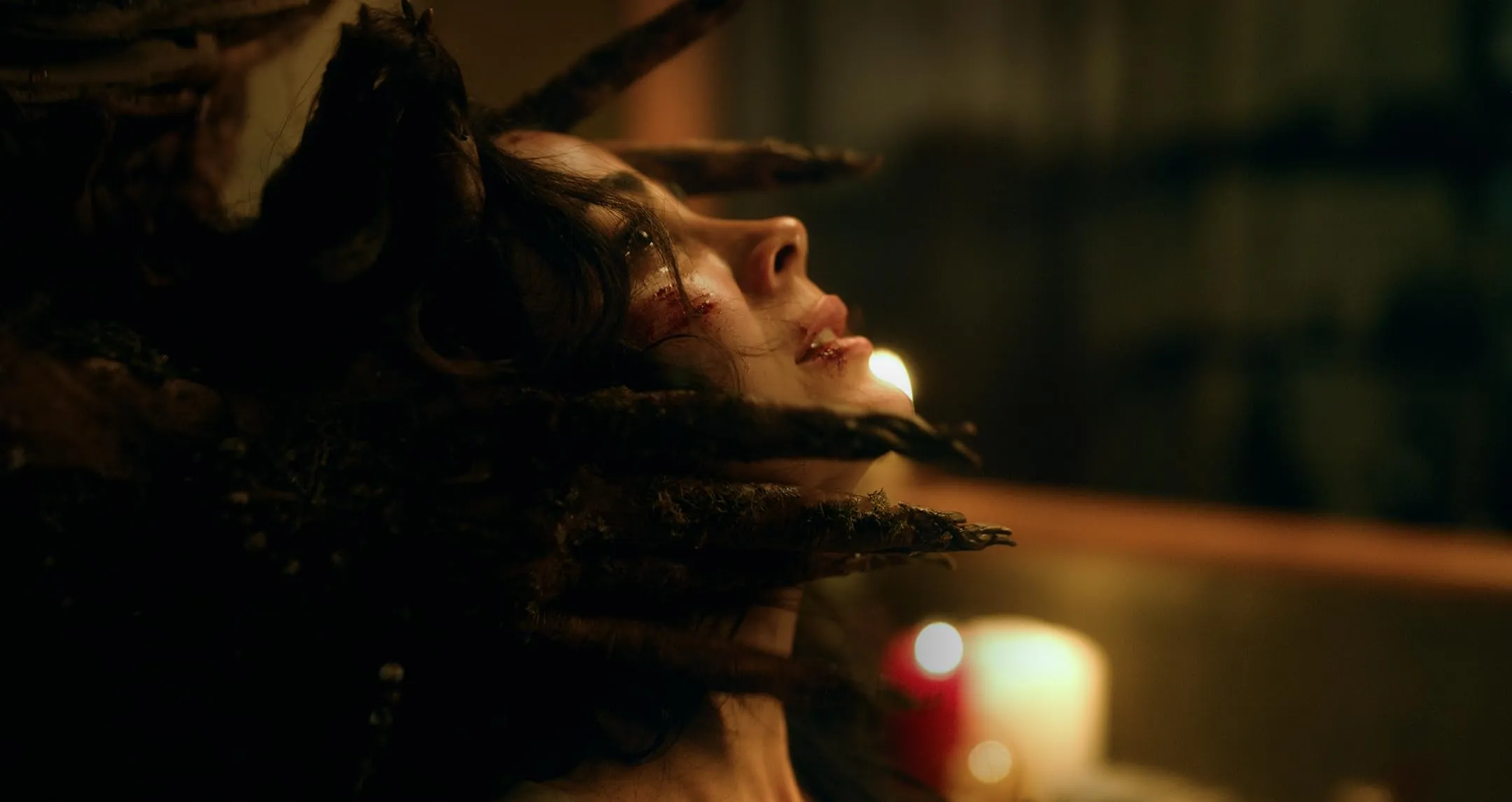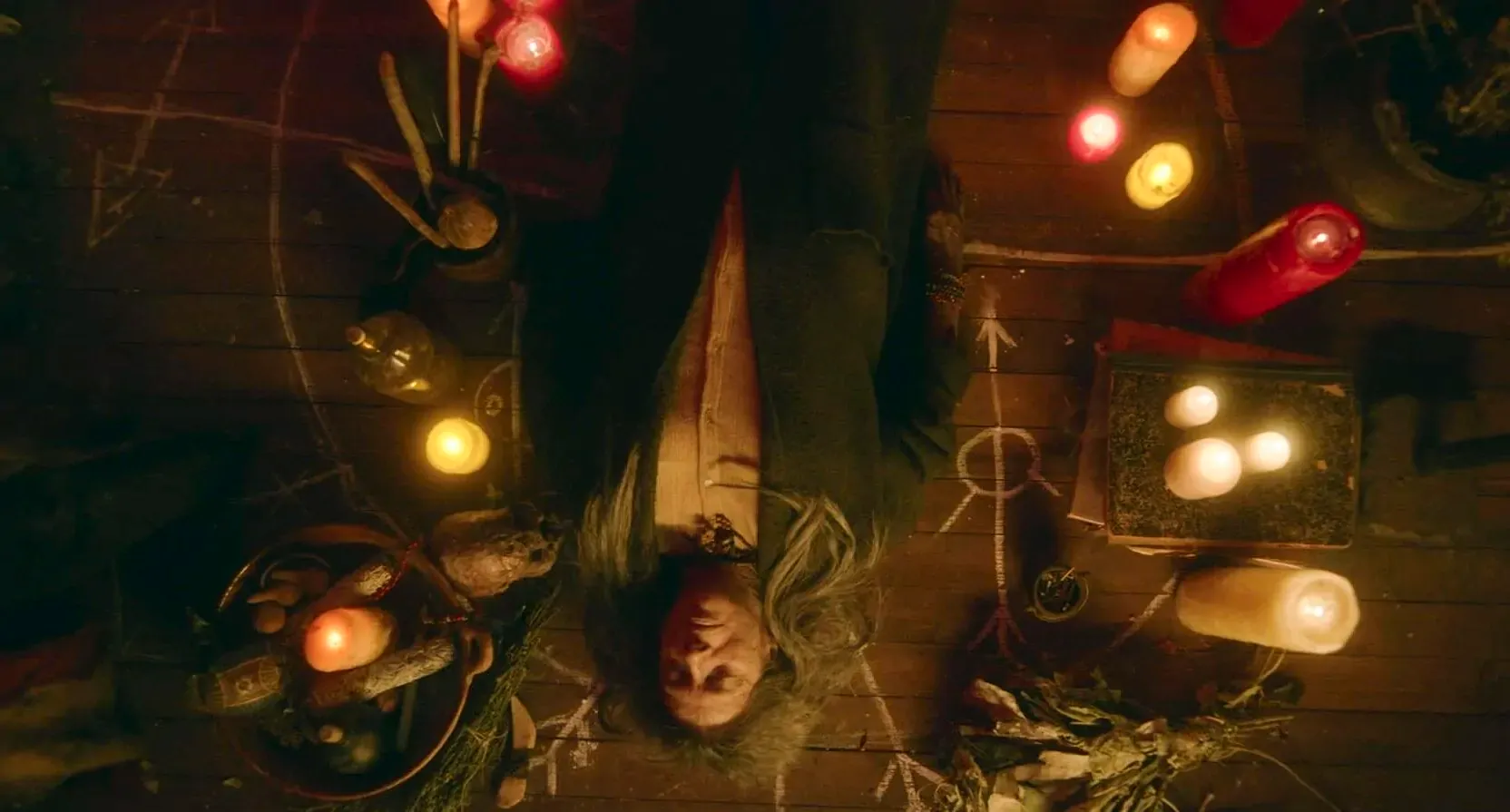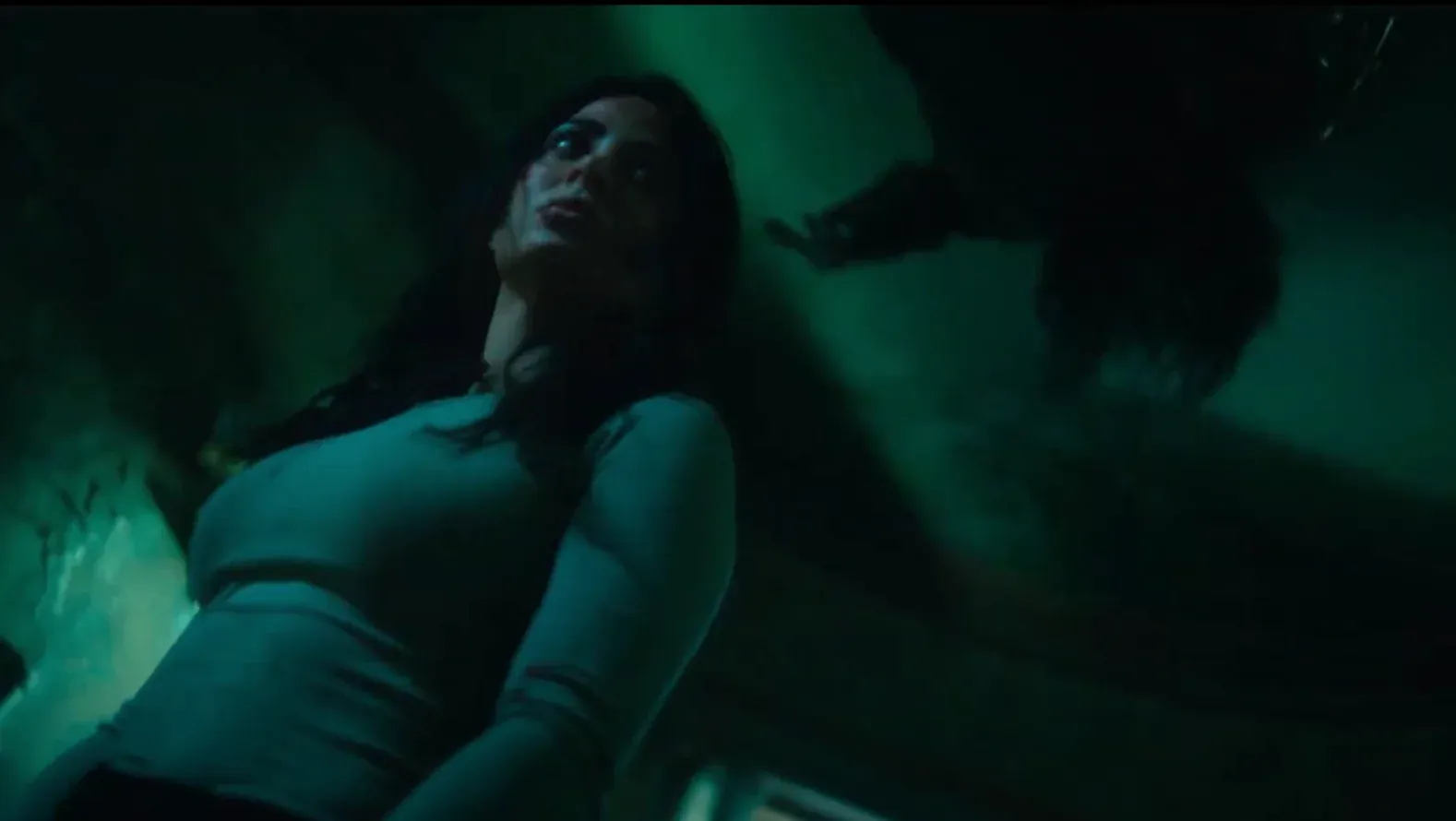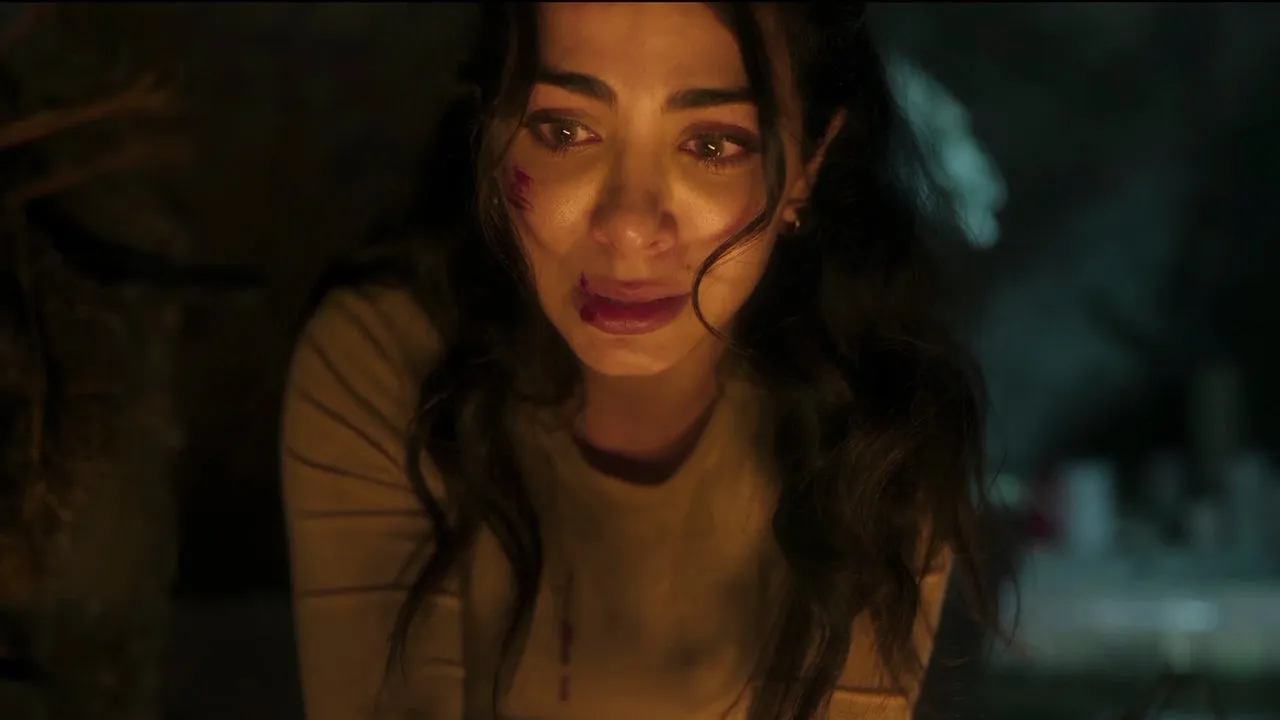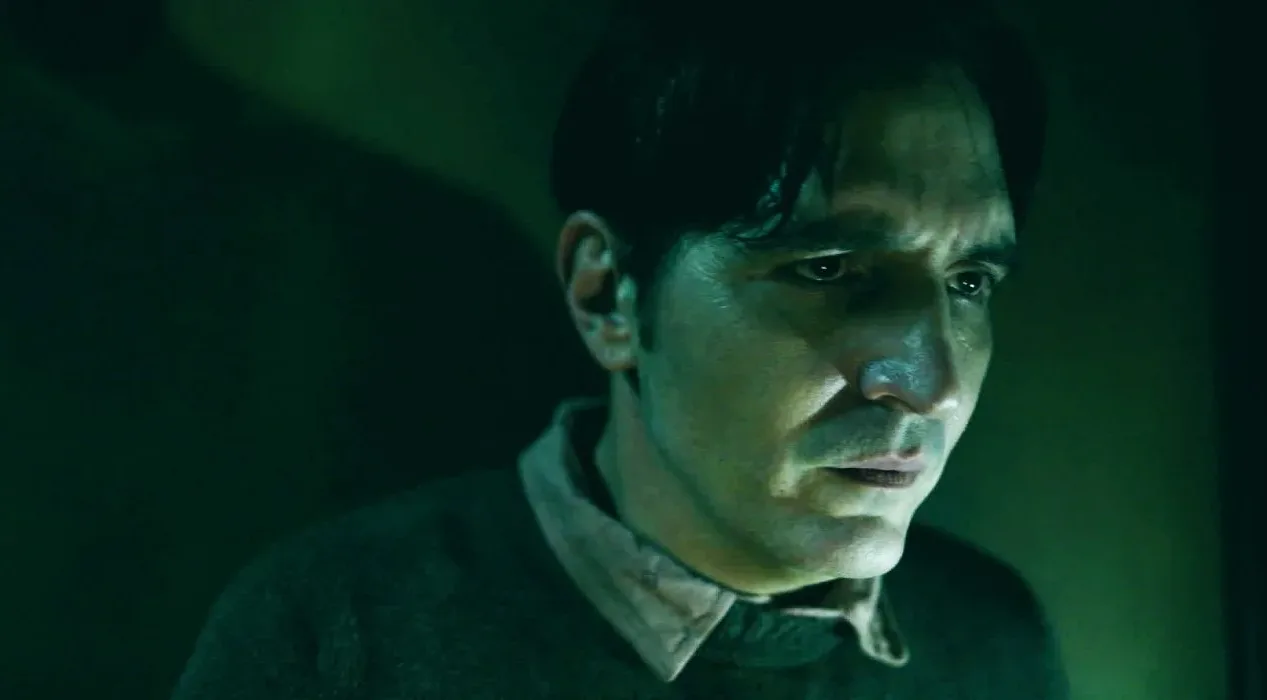Rosario unfolds in two distinct chapters. In 1999, a family in a Brooklyn apartment celebrates a young girl’s birthday, but a cryptic exchange with her grandmother hints at hidden darkness. Jump to 2025, and Rosario Fuentes, now a high-flying stockbroker in Manhattan, learns of that grandmother’s death during a fierce winter storm. Trapped in the late matriarch’s cramped, decaying flat, she confronts eerie phenomena that tear at the seams of her disciplined life.
Writer Alan Trezza structures the script around this collision: a pristine professional pulled back into a world of dirt, ritual and forgotten bonds. Director Felipe Vargas maintains tension through tight geography—narrow hallways, flickering lights and a relentless blizzard outside.
The story follows a familiar arc of discovery, escalation and revelation; yet the contrast between the two timelines underlines Rosario’s emotional stakes. Character arcs hinge on the breach between past and present: a granddaughter who fled her roots must piece together her grandmother’s secret litanies to survive.
This film arrives at a moment when horror leans heavily on isolation and practical effects. Its possession subgenre roots lie in classics, but it signals a shift toward intimate portraits of family trauma. Rosario’s premiere promises visceral frights wrapped in cultural texture.
Temporal Design & Structural Momentum
Trezza arranges Rosario around a prologue and its echo, opening in 1999 with a birthday celebration that sours when the grandmother’s muttered warning surfaces. That initial vignette plants a seed of dread, then vaults two decades ahead. The abrupt cut to 2025 underscores Rosario’s journey from familial warmth to professional detachment, setting up an emotional chasm that the unfolding terror must bridge.
The inciting incident arrives with a terse phone call: Griselda has died, and a vicious blizzard strands Rosario in the decrepit flat. This choice—exposition delivered through urgent dialogue—avoids padding and kicks the plot into motion. From there, the film adheres to a familiar three-act scaffold: discovery, escalation and revelation. Yet the confined setting keeps each beat focused, resisting narrative drift.
As the action ramps up, isolation becomes a character in its own right. Rosario’s lone exploration of dusty cupboards and her reaction to crawling insects reveal backstory through environment rather than flashbacks. The neighbor’s odd interruptions and her intermittent calls to her father inject relief without derailing momentum. Each detail—an occult altar here, a bloodstained symbol there—builds dread with surgical precision.
By the climax, supernatural assaults transform the flat into a labyrinth of limbs and whispers. The ritual’s mechanics emerge organically: clues uncovered in earlier beats pay off when Rosario deciphers her grandmother’s hidden texts. The third-act twist—that Griselda was a practitioner of Palo Mayombe—feels earned, though its foreshadowing proves generous.
Pacing holds firm until the final act, when the film briefly stalls under the weight of its own mythology. Yet the ritual confrontation delivers catharsis, and the closing shot—a silhouette framed by swirling snow—leaves questions dangling. In mapping this narrative path, Rosario shows that even well-trodden structures can still surprise when every scene pulls double duty: advancing plot while deepening character.
Themes & Symbolism
Rosario’s fractured family ties lie at the heart of its narrative. The protagonist fled childhood warmth for Wall Street’s glow, severing more than just geographical connections. Her grandmother’s altar—hidden behind rotting planks—acts as a silent witness to a heritage she denied. That relic room brims with toys, photographs and ritual tools: tiny items anchoring decades of buried memory and unspoken loyalties.
Cultural identity animates every frame. The camera lingers on rosary beads and imported candles alongside cauldrons etched with Afro-Caribbean symbols. These juxtapositions stage a quiet struggle between Catholic rites and Palo Mayombe traditions brought to Brooklyn by immigrants seeking renewal. This conflict pulses through key moments: a prayer muttered in Spanish, a chant that trembles through empty rooms.
Trauma hides in objects: a child’s chipped doll, a faded school photo, a bloodstain on the kitchen wall. These become characters in themselves, conveying stories beyond dialogue. A single close-up of Rosario’s trembling hand on a weathered ledger communicates regret more vividly than speech ever could.
Guilt and sacrifice drive Rosario’s arc. At first she flinches at bruised skin; by the end she embraces pain as a means to reconcile with family history. Denial shifts into purpose with each ritual clue she uncovers.
Snowdrifts become backdrop and pressure cooker. They isolate her, sever cellphone signals and trap her inside a mind mirrored by peeling wallpaper and broken glass. That freezing void shapes her choices. The storm outside and the decay within the flat reflect a psyche unraveling, piece by piece.
Direction & Technical Craft
Felipe Vargas’s first feature marries intimate staging with brisk momentum. He paces the film so each scare lands precisely, while quieter moments let dread settle. Echoes of Evil Dead’s kinetic camerawork appear in sudden zooms and wide-angle sweeps, but Vargas deploys them judiciously, favoring a handheld approach that mirrors Rosario’s mounting panic.
The apartment’s tight corridors function as a pressure chamber. Long, unbroken takes follow Rosario through dim hallways, compressing the frame until even breathing seems audible.
The flashback sequences glow in soft amber hues, contrasting sharply with the flat’s sickly green shadows and stark silhouettes. Every surface bears the weight of neglect—flaking paint, crawling insects and scattered ritual objects create a set that feels vitally alive. These tangible details ground the supernatural, making the environment a silent antagonist.
Editor’s choices shift between languid dread and abrupt jolts. A slow pan invites scrutiny of a filthy shelf; then a whip cut reveals a demonic limb thrusting through a doorway. That rhythm—linger, then shock—maintains tension without feeling mechanical.
Music remains sparing. Instead, ambient creaks, the whistle of wind through broken windowpanes and distant muttering fill the soundtrack. When a low drone emerges, it arrives in tandem with a ritual revelation, reinforcing key moments instead of hammering them.
Horror sprouts from hands-on craftsmanship. Maggots burrow from nostrils; dark veins pulse beneath translucent skin; grotesque limbs snake through cracks. Each effect avoids digital gloss, preserving a gritty authenticity that pays dividends in close-up.
Together, Vargas’s direction, the visual palette, editorial precision, soundscapes and tactile horror form a unified engine. Every technical choice tightens the narrative, driving Rosario’s descent through isolation and ancient rites.
Anchoring the Haunt: Performances That Drive Rosario
Emeraude Toubia holds the center with measured precision. Her Rosario begins as a composed broker—tailored suits, clipped calm—then fractures under supernatural pressure. In possession scenes she contorts limbs and twists voice with convincing abandon, selling each moment of terror without slipping into caricature.
Constanza Gutierrez makes Griselda speak volumes in silence. Early on, a tremor in her gaze hints at buried rituals; later, makeup and posture transform her frailty into something uncanny. Her stillness punctuates the chaos around her, reminding us that menace need not shout.
Diana Lein’s turn as Elena surfaces through brief flashbacks, giving emotional weight to Rosario’s estrangement. Lein never overstates grief; a single glance suffices to explain why Rosario fled. These echoes of the past deepen the stakes of every incantation and rusted cauldron.
David Dastmalchian arrives as Joe, carrying an air fryer and sly humor. His repeated knocks shift from comic relief to uneasy intrusion, briefly diverting tension before snapping it taut again. It’s a clever use of a familiar face that keeps expectations in check.
Minor roles lend texture: the superintendent’s deadpan updates amplify dread, and Rosario’s panicked phone calls to her father ground the surreal in real-world urgency. Together, these performances forge a tapestry of human reaction—fear, regret and stubborn resolve—that fuels every chilling beat.
Encapsulated Dread
Much of Rosario’s tension rests in one apartment. The camera threads along narrow hallways, where peeling wallpaper and grimy surfaces scrape at the edges of composure. Exits close behind the protagonist; every door becomes both promise and threat. That restraint feels deliberate, as if walls themselves conspire to trap her.
A blizzard rages beyond frosted windows. Communication flickers, then dies. Rosario’s solitude intensifies each creak and distant moan. With every failed call and blocked corridor, the film underscores helplessness. Viewers share her sense of being cut off—a vulnerability that amplifies even the faintest rustle.
Rather than lean on sudden frights, the story lets dread simmer. A half-seen silhouette. A slow, deliberate camera push into darkened corners. Jump scares arrive sparingly; instead, anticipation coils until it snaps. When a muted thump finally breaks the hush, it lands with earned force.
Visually, the palette feels muted: grays and sickly greens drape every frame. Light sources spill uneven pools, leaving pockets of blackness where horrors can lurk. Shadows stretch like living tendrils, hinting at violence beyond what the eye can register.
Rosario borrows familiar possession tropes but refracts them through cultural nuance. At one point, she pauses for a quick search—face lit by smartphone glow—before consulting ceremonial texts. That pragmatic beat sits alongside ritual realism, suggesting a heroine who applies both reason and ancient practice to confront what lives in the dark.
Aftermath & Enduring Echoes
Rosario’s impact comes from its refusal to overextend. Practical effects land with visceral force, and Toubia’s performance keeps each possession beat anchored in human stakes. Cultural rituals—far from window dressing—become narrative pivots, giving the horror a lived-in weight.
Pacing stumbles when the lore grows dense. Third-act revelations follow a well-worn path; anyone familiar with possession tales will anticipate each ritual turn. Supporting players, intriguing at first, recede when the plot demands ritual mechanics. Dastmalchian’s neighbor starts as an unsettling foil, then vanishes when the narrative shifts into exorcism mode.
Still, Vargas’s command of confined space signals promise. The storm outside and the flat’s peeling walls trap character and viewer in shared isolation. Quiet tension builds steadily until each creak or shadow feels charged. For those who prefer atmosphere over spectacle, Rosario delivers a satisfying claustrophobic experience.
It may not rewrite the rules of supernatural cinema, but it stakes a claim in a crowded field. As a first feature, it reveals a director capable of wringing fresh dread from cramped quarters. If Vargas continues along this trajectory, his next work could push the genre into genuinely uncharted territory.
Full Credits
Director: Felipe Vargas
Writer: Alan Trezza
Producers: Phillip Braun, Javier Chapa, Jon Silk
Executive Producers: Emeraude Toubia, Bruce Barshop, Simon Beltran Echeverri, Vincent Cordero, Arianne Fraser, Delphine Perrier, Juan Pablo Solano, Caleb Ward, Simon Wise, Kristopher Wynne
Cast: Emeraude Toubia (Rosario Fuentes), David Dastmalchian (Joe), José Zúñiga (Oscar Fuentes), Paul Ben-Victor (Marty), Diana Lein (Elena Fuentes), Emilia Faucher (Young Rosario), Guillermo García (Miguel), Constanza Gutiérrez (Griselda), Isabella Hoyos (Paramedic)
Director of Photography (Cinematographer): Carmen Cabana
Editor: Claudia Castello
Composers: Brooke Blair, Will Blair
The Review
Rosario
Rosario delivers a taut, atmospheric descent into family secrets and supernatural dread, anchored by Emeraude Toubia’s compelling turn and striking practical effects. Though familiar possession beats and uneven pacing hold it back, the film’s cultural texture and claustrophobic tension make it a worthy genre entry. Felipe Vargas’s debut hints at greater promise ahead.
PROS
- Striking practical effects that heighten visceral impact
- Claustrophobic setting amplifies tension
- Emeraude Toubia anchors the story with fierce commitment
- Cultural rituals lend depth to familiar horror beats
- Sound and lighting choices sustain sustained dread
CONS
- Possession tropes feel plainly familiar
- Pacing falters as lore intensifies
- Key supporting players fade when the plot demands exposition
- Third-act twist arrives just as anticipated









































